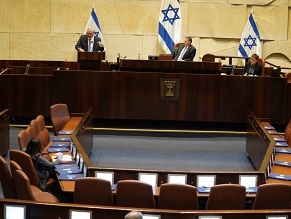|
World Jewish News

Blue and White leader Benny Gantz (L) addressing the Knesset next to Knesset Speaker Yuli Edelstein, March 23, 2020. (Shmulik Grossman/Knesset)
|
In victory for Blue and White, Knesset votes to form key oversight panel
23.03.2020, Israel After a delay in the vote drew accusations of stifling Israel’s democracy, the Knesset on Monday evening approved the establishment of the Arrangements Committee, which determines which parliamentary committees will be formed and who will sit on them.
The proposal to establish the committee passed 61 in favor and zero against, with right-wing and religious lawmakers allied with Prime Minister Netanyahu boycotting the vote. Knesset Speaker Yuli Edelstein, a member of Netanyahu’s Likud party, was the only lawmaker to abstain.
The new Arrangements Committee will be composed of 17 MKs, eight from Prime Minister Benjamin Netanyahu’s right-wing religious bloc and nine from parties that oppose him. The committee will be headed by Blue and White MK Avi Nissenkorn.
Adhering to Health Ministry restrictions, applied to the Knesset by Edelstein, MKs voted in batches of six in order to avoid the presence of more than 10 people at a time in the plenary. Two MKs — Blue and White’s Alon Shuster and Ram Ben-Barak — voted from behind the glass of the Knesset public gallery; both are currently under quarantine due to contact with someone diagnosed with the coronavirus.
Edelstein set off a firestorm of criticism last Wednesday after he refused to allow the Knesset plenum to convene votes both on establishing the Arrangements Committee and electing a new speaker. Edelstein at first argued that the freeze was linked to safety precautions amid the coronavirus outbreak, and later claimed it was meant to force Likud and Blue and White to compromise, in unity talks.
Critics said it amounted to an illegal shuttering of parliament by the Likud party in order to improve the party’s leverage in the coalition talks, and some argued that it constituted part of an attempted political coup, with a parliamentary majority headed by Gantz prevented from assuming control of the Knesset’s agenda.
Speaking in the plenary before the vote, Blue and White chairman Benny Gantz accused Netanyahu of “trying to silence the Knesset, something that has not been done in any other functioning democracy and must never be done in the State of Israel.”
He said that establishing the Knesset committees was “essential” to allow the necessary parliamentary oversight of the government, especially during a crisis like the coronavirus outbreak.
According to the Israel Democracy Institute think tank, the temporary freeze in parliament’s functioning, which ended Monday, appears to be unique among democratic parliaments during the COVID-19 pandemic. While many parliaments have curtailed or changed working arrangements due to the virus, only two others stopped operations altogether, those of Romania and Canada. In both cases — unlike in Israel — the parliament’s members voted for the move.
In the first sitting of the Arrangements Committee Monday night, Blue and White planned to immediately establish the Foreign Affairs and Defense Committee, the Finance Committee and a special committee to oversee the handling of the pandemic.
Knesset legal adviser Eyal Yinon said in a legal opinion on Sunday that Edelstein did not have the authority to prevent Knesset plenum gatherings, particularly given his standing as an acting speaker held over from the 21nd Knesset, two inconclusive elections ago. That status limited his ability to declare sweeping restrictions on the Knesset’s work, including the decision not to allow plenum votes that could replace him with a new speaker.
“A situation in which an unelected Knesset speaker serves only by virtue of the principle of continuity is likely to lead to a result in which the current majority in the Knesset finds it difficult to advance moves that it wants,” Yinon wrote.
Earlier Monday, the High Court of Justice indicated that Edelstein should schedule a parliamentary vote on his replacement by Wednesday. Justice Minister Amir Ohana (Likud) and other Netanyahu allies promptly urged Edelstein to ignore the justices.
Edelstein has argued over the past week that Blue and White’s tenuous 61-seat majority, which includes the Arab-majority Joint List, cannot form a stable government of its own. Since a unity government was the only viable alternative, and since, he has claimed, no government can function without a cooperative speaker, the next speaker should not be chosen until the final shape of the next government has been hammered out between the sides.
By RAOUL WOOTLIFF
The Times of Israel
|
|
